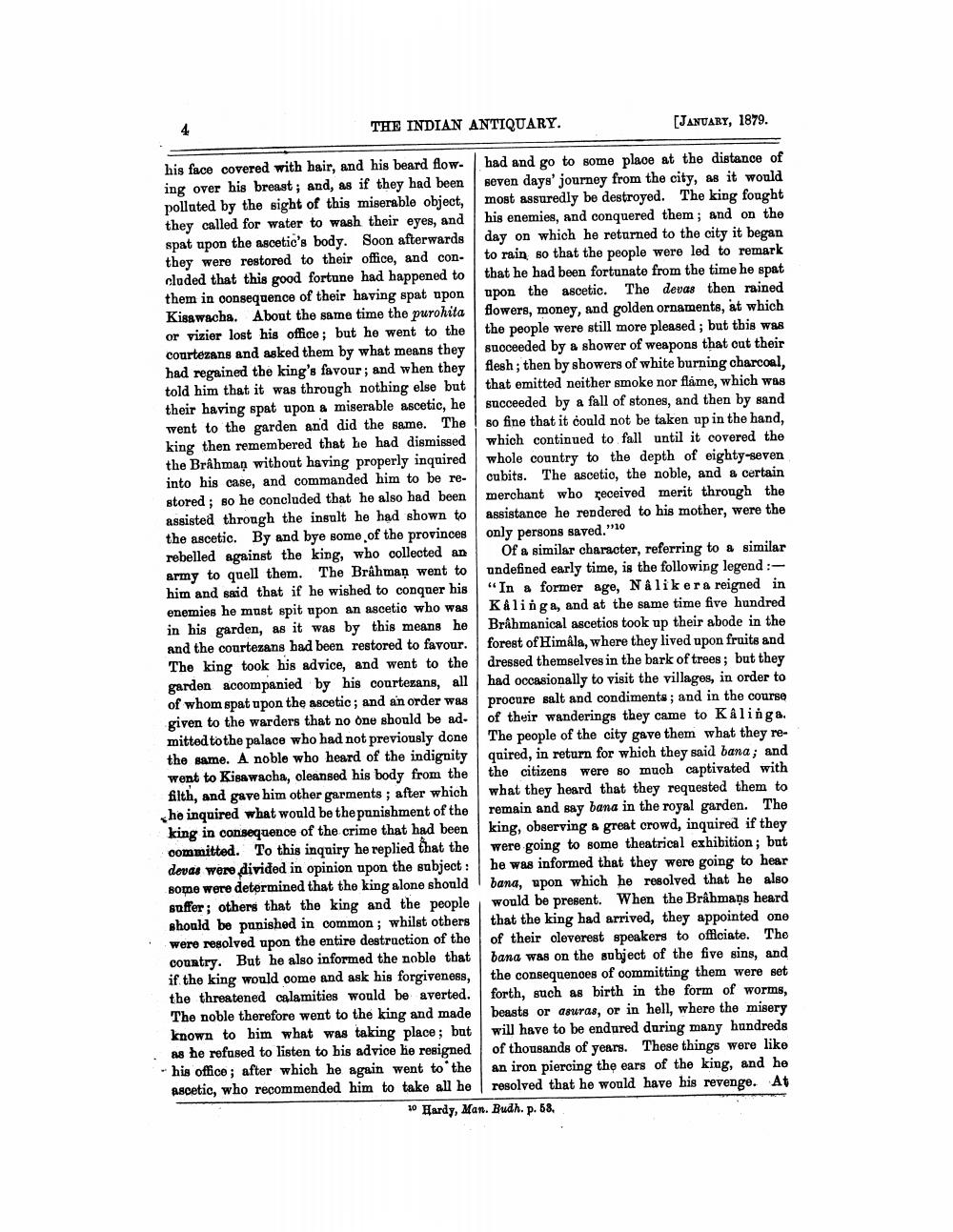________________
THE INDIAN ANTIQUARY.
(JANUARY, 1879.
his face covered with hair, and his beard flow- had and go to some place at the distance of ing over his breast; and, as if they had been seven days' journey from the city, as it would polluted by the sight of this miserable object, most assuredly be destroyed. The king fought they called for water to wash their eyes, and his enemies, and conquered them; and on the spat upon the ascetic's body. Soon afterwards day on which he returned to the city it began they were restored to their office, and con- to rain so that the people were led to remark cluded that this good fortune had happened to that he had been fortunate from the time he spat them in consequence of their having spat upon upon the ascetic. The devas then rained Kisawacha. About the same time the purohita flowers, money, and golden ornaments, at which or vizier lost his office; but he went to the the people were still more pleased; but this was courtezans and asked them by what means they suoceeded by a shower of weapons that out their had regained the king's favour; and when they flesh; then by showers of white burning charcoal, told him that it was through nothing else but that emitted neither smoke nor flame, which was their having spat upon a miserable ascetic, he succeeded by a fall of stones, and then by sand went to the garden and did the same. The so fine that it could not be taken up in the hand, king then remembered that he had dismissed which continued to fall until it covered the the Brâhman without having properly inquired whole country to the depth of eighty-seven into his case, and commanded him to be re- cubits. The ascetio, the noble, and a certain stored; so he concluded that he also had been merchant who received merit through the assisted through the insult he had shown to assistance he rendered to his mother, were the the ascetic. By and bye some of the provinces only persons saved." rebelled against the king, who collected an Of a similar character, referring to a similar army to quell them. The Brahmaņ went to undefined early time, is the following legend :him and said that if he wished to conquer his "In a former age, Nâlikera reigned in enemies he must spit upon an ascetio who was Kalinga, and at the same time five hundred in his garden, as it was by this means he Brahmanical ascetios took up their abode in the and the courtezans had been restored to favour. forest of Himála, where they lived upon fruits and
The king took his advice, and went to the dressed themselves in the bark of trees; but they garden accompanied by his courtesans, all had occasionally to visit the villages, in order to of whom spat upon the ascetic; and an order was i procure salt and condiments, and in the course given to the warders that no one should be ad of their wanderings they came to Kalinga, mitted to the palace who had not previously done The people of the city gave them what they rethe same. A noble who heard of the indignityquired, in return for which they said bana; and went to Kisawacha, oleansed his body from the the citizens were so much captivated with filth, and gave him other garments ; after which what they heard that they requested them to he inquired what would be the punishment of the remain and say bana in the royal garden. The king in consequence of the crime that had been king, observing a great crowd, inquired if they committed. To this inquiry he replied that the were going to some theatrical exhibition; but devas were divided in opinion upon the subject: he was informed that they were going to hear some were determined that the king alone should bana, upon which he resolved that he also suffer: others that the king and the people would be present. When the Brahmans heard should be punished in common; whilst others that the king had arrived, they appointed one were resolved upon the entire destruction of the of their cleverest speakers to officiate. The country. But he also informed the noble that bana was on the subject of the five sins, and if the king would come and ask his forgiveness, the consequences of committing them were set the threatened calamities would be averted. forth, such as birth in the form of worms,
The noble therefore went to the king and made beasts or asuras, or in hell, where the misery known to him what was taking place; but will have to be endured during many hundreds as he refused to listen to his advice he resigned of thousands of years. These things were like his office; after which he again went to the an iron piercing the ears of the king, and he Ascetic, who recommended him to take all he resolved that he would have his revenge. At
10 Hardy, Man. Budh. p. 58.




